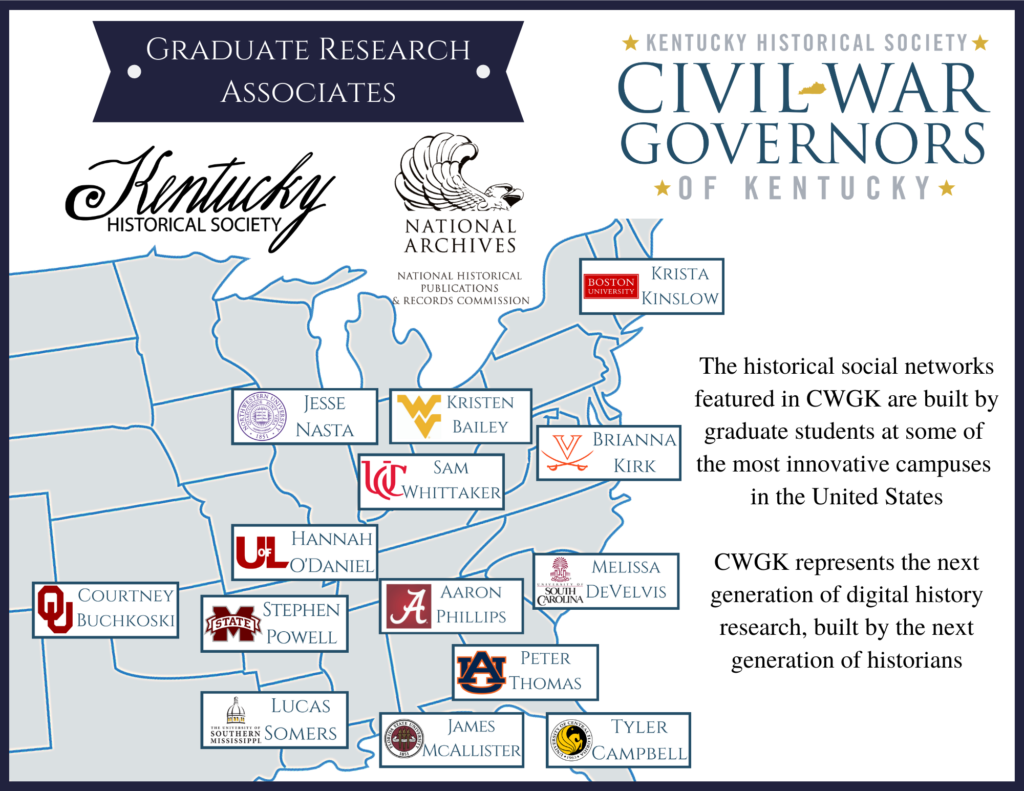Overview: The Kentucky Historical Society and its project the Civil War Governors of Kentucky Digital Documentary Edition (CWGK) seek three graduate students who are passionate about the study of nineteenth-century America, the resurrection of marginalized voices, and are eager to learn more about digital history. With the generous support of the National Historical Publications and Records Commission (NHPRC), a branch of the National Archives, CWGK will be able to hire three Graduate Research Associates (GRAs) to conduct editorial work for the project from over the period February 1, 2021 to January 31, 2022. GRAs are compensated with a production-based stipend of $4,000 and can work remotely from their home institutions.
Each GRA will annotate 120 assigned documents and spend approximately 250 hours on this work over the course of the year. All applicants must be a graduate student who have completed at least one semester of a M.A. program in history, or a related humanities discipline (doctoral students/candidates preferred, but not required). Experience with nineteenth-century United States history or documentary editing is also preferred, but not necessary. The new GRAs would continue a successful four-year program that has involved 14 other young scholars and digital humanists.

CWGK is an annotated, searchable, and freely-accessible online edition of documents associated with the chief executives of the Commonwealth from 1860 to 1865. However, CWGK is about more than the nominal governors; it is about reconstructing the lost lives and voices of tens of thousands of Kentuckians who interacted with the office of the governor during the war years. Collectively, the staff of CWGK identify, research, and link together every person, place, and organization found within its corpus of documents. To see the project’s work to date, visit discovery.civilwargovernors.org.
Each GRA will be responsible for researching and writing short entries on all of the individuals, places, organizations, and geographical features found in their assigned 120 documents. On average, each CWGK document contains fifteen entities and such documents require approximately two hours to complete.
The GRA position is more than just editorial work, it is an opportunity to diversify professional skills, engage with relevant digital humanities projects, and participate in a process that shapes how scholars and the public understand the Civil War era. Throughout their appointment, GRAs will meet weekly with the CWGK team, discussing editorial policy, working on document annotation, and studying the field of Civil War history more broadly.
Each GRA will work remotely. Interaction with the documents and the writing of annotations will take place in a web-based annotation tool developed for CWGK, which can be accessed from any location. CWGK will make use of online research databases to make its work efficient and uniform. Other archival sources may be of value but are not required by the research guidelines. Securing access to the paid databases required by CWGK (Ancestry.com, Fold3.com, and ProQuest Historical Newspapers: Louisville Courier Journal) is the responsibility of the GRA. If regular institutional access to these databases is not available to the GRA through a university or library, it is the responsibility of the GRA to purchase and use a subscription to these databases. KHS will not reimburse the GRA for any travel, copying, or other expenses incurred in CWGK research.
Application Materials and Evaluation: An application should consist of a narrative statement of professional ability and experience with digital history in the form of a cover letter, a CV, and two letters of recommendation. Additional supplementary materials that demonstrate capacity in the evaluation factors may also be included, these may include, but are not limited to: examples of other digital projects, writing samples, or proof of editorial experience.
Application materials should be submitted to Dr. Chuck Welsko, Project Director at charles.welsko@ky.gov by January 5, 2021. Any questions about the application or application process can also be directed to Dr. Welsko.
The Kentucky Historical Society will evaluate the applicants based on the following factors, as demonstrated through their applications materials:
Research Experience (70 points): Describe your familiarity with research in nineteenth-century U.S. history. Describe some projects you have undertaken. What sources have you used? Have you been published? Have you interpreted historical research in forms other than a scholarly peer-reviewed publication? Discuss how a digital archival experience differs from your traditional archival experience.
Project Experience (30 points): Describe any work you have done in the editing of historical documents. Discuss how a project such as CWGK maintains balance between thorough research and production schedules. Have you worked on other collaborative projects in the field of history or otherwise? Describe the importance of time management and deadlines in your work. Describe your understanding of and/or experience with the Digital Humanities. From what you know of the CWGK project, how does it fit with current trends in the field? What do you hope to gain from working on the CWGK project?
